The MassARRAY system from Agena Bioscience™ is a desktop mass spectrometry system that provides sensitive, accurate and rapid analysis of nucleic acids. With capacity of performance to satisfy the needs of any volume of work, fast at the time of providing results, and with the capacity to interrogate hundreds of mutations. Discover here the different Agena Bioscience reagents.
- Assays by Agena and Custom Assay Options
- iPLEX Pro reagents
- iPLEX HS reagents
- UltraSEEK reagents
- MassCLEAVE reagents
Assays by Agena and Custom Assay Options
Agena Bioscience offers several pre-designed and verified assays for use on the on MassARRAY system across the different application areas. In addition, the following options are available for custom assay development.
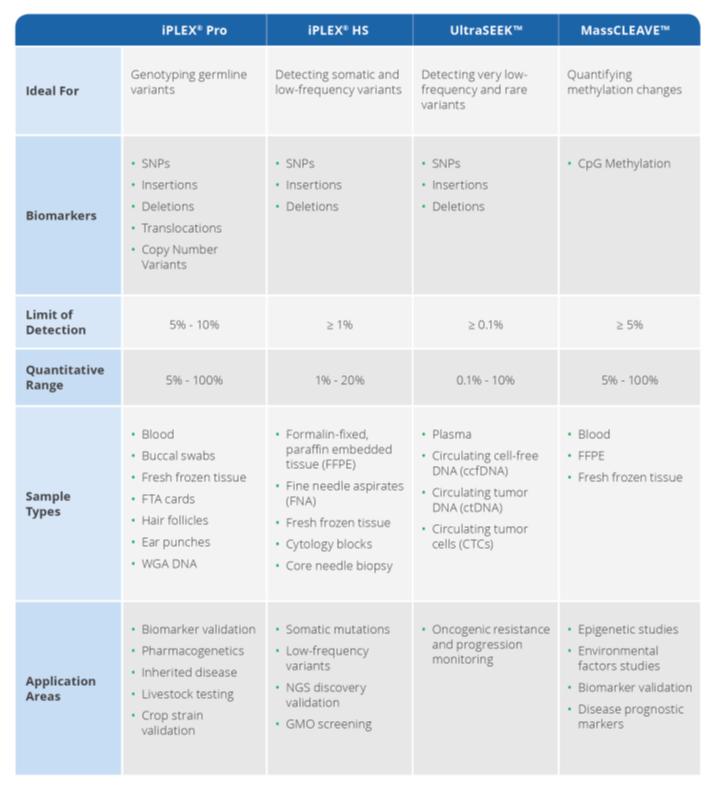 Create your own panel with Assay design tools
Create your own panel with Assay design tools
Assay Design Suite is a streamlined tool for designing genotyping, somatic mutation, gene fusion, and ultrasensitive assays. Given a NCBI dbSNP rs number or FASTA DNA sequence, the software identifies and designs optimal PCR and extension primers for each variant of interest, including insertions and deletions. Compatible markers are multiplexed into a single well to increase breadth of coverage and minimize DNA input. Depending on the number and type of variants, anywhere from one to multiple wells per sample can be designed.
EpiDesigner software is available for designing methylation assays. Using an input of genomic DNA sequence, the software designs multiple PCR primers for bisulfite converted DNA giving the user the option to select the optimal primers to interrogate their CpG sites of interest.
Both software tools are hosted online on Agena Bioscience’s customer portal, AgenaCx, and provide a user-friendly interface for designing and modifying panels, enabling easy addition of newly discovered markers to laboratory tests.
iPLEX Pro reagents
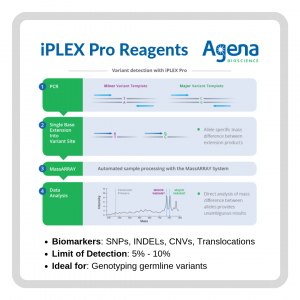 The iPLEX Pro chemistry combines the benefits of simple, reproducible, PCR-based primer extension reaction chemistry with state-of-the-art mass spectrometry to quickly and cost-effectively characterize genotypes with the highest levels of accuracy. The iPLEX assay allows you to routinely design assays at a multiplexing level of 25 to 40 variants per reaction, which gives a high level of flexibility and a low cost per genotype. With direct mass detection of the variant of interest, multi-allelic and copy number variants can be easily identified. Have a look to our blog entry.
The iPLEX Pro chemistry combines the benefits of simple, reproducible, PCR-based primer extension reaction chemistry with state-of-the-art mass spectrometry to quickly and cost-effectively characterize genotypes with the highest levels of accuracy. The iPLEX assay allows you to routinely design assays at a multiplexing level of 25 to 40 variants per reaction, which gives a high level of flexibility and a low cost per genotype. With direct mass detection of the variant of interest, multi-allelic and copy number variants can be easily identified. Have a look to our blog entry.
These reagents are ideally suited for:
- – Genotyping
- – Carrier screening & Inherited disease assays
- – Biomarker validation
- – Pharmacogenetics studies
- – Sample identification and qualification
iPLEX HS Reagents
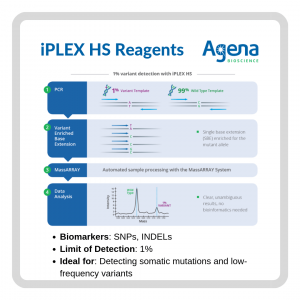 The iPLEX High Sensitivity chemistry increases the sensitivity of the iPLEX reaction by restraining the wild type signal, thereby amplifying the variant signal. With multiplexing of up to 15 variants per reaction, the iPLEX HS chemistry enables detection of variants as low as 1% minor allele frequency (MAF) using minimal DNA input. The short amplicon length (80 -120 bp) makes it an ideal method for use with degraded samples.
The iPLEX High Sensitivity chemistry increases the sensitivity of the iPLEX reaction by restraining the wild type signal, thereby amplifying the variant signal. With multiplexing of up to 15 variants per reaction, the iPLEX HS chemistry enables detection of variants as low as 1% minor allele frequency (MAF) using minimal DNA input. The short amplicon length (80 -120 bp) makes it an ideal method for use with degraded samples.
Ideally suited for:
- – Low frequency variant detection from somatic tissue.
- – Identifying oncogenic markers in FFPE tissue, core needle biopsies, FNA and cytology smears.
- – Validation of NGS discoveries.
- – GMO screening.
UltraSEEK chemistry
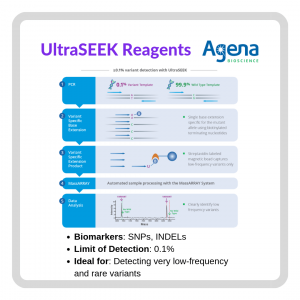 The UltraSEEK chemistry extends the sensitivity of the MassARRAY system to as low as 0.1% MAF for liquid biopsy. This ultra-sensitivity is achieved by mutant specific single base extension and capture by streptavidin-labeled magnetic beads. You can still multiplex up to 15 markers in a single reaction and identify over 100 variants from minimal starting material.
The UltraSEEK chemistry extends the sensitivity of the MassARRAY system to as low as 0.1% MAF for liquid biopsy. This ultra-sensitivity is achieved by mutant specific single base extension and capture by streptavidin-labeled magnetic beads. You can still multiplex up to 15 markers in a single reaction and identify over 100 variants from minimal starting material.
Ideally suited for:
- – Rare variant detection
- – Identification of oncogenic resistance and progression markers from ctDNA, ccf-DNA, CTCs.
- – Non-invasive testing
MassCLEAVE reagents
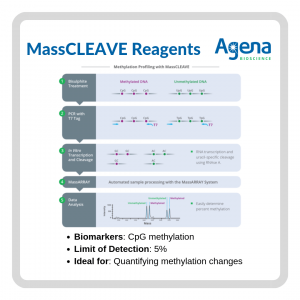 The MassCLEAVE chemistry enables high-resolution, quantitative methylation profiling on the MassARRAY system. Easily detect differences as low as 5% between methylated and non-methylated DNA.
The MassCLEAVE chemistry enables high-resolution, quantitative methylation profiling on the MassARRAY system. Easily detect differences as low as 5% between methylated and non-methylated DNA.
Ideally suited:
- – Profiling CpG methylation changes across 150 bp – 550 bp amplicons
- – Identifying methylation changes in FFPE tissue and other sample types
- – Validation of methylation arrays, NGS, or gene promoter studies

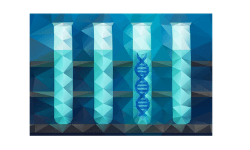



Leave a reply